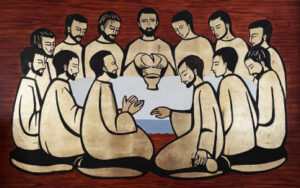Report on Diocesan CSW2024 Post-Primary Schools Mass

The annual Diocesan Mass for Post-Primary Schools to mark Catholic Schools Week was celebrated in the Cathedral of Saint Patrick and Saint Felim, Cavan, on Tuesday 23 January 2024 at 11:30a.m. on the theme of “Catholic Schools as Communities of Service”.
It was organised by Mrs. Patricia Sheridan, Diocesan Post-Primary Schools Catechetical Advisor. Students from post-primary schools across the diocese participated in the Mass with the choir of St. Clare’s College in Ballyjamesduff providing the music.
Monsignor Liam Kelly was the principal celebrant and homilist assisted by Fr. Andrew Tully, PP Killeshandra and Chaplain to St. Patrick’s College (Cavan), Fr. Ultan McGoohan, PP Bailieborough and Chaplain to Bailieborough Community School, and Rev. Jordan MacGabhann (Deacon).
The text of Monsignor Kelly’s homily is given below:
Philip Larkin, an Englishman who was born in the year 1922 and died in 1985, was one of great poets of the twentieth century. His poetry is popular and easy to understand. Once when he was mowing his over-grown lawn, the lawnmower stalled and when he checked, to his horror, he discovered that he had killed a hedgehog that was hiding in the long grass. This devastated him and led him to reflect on life and how it can be cruel and how we human beings should treat each other and he wrote about this in a poem called ‘The Mower’. He finished his short poem with the lines
We should be careful
of each other, we should be kind
while there is still time.
There is great wisdom in these lines, lines which emphasise the importance of us human beings being full of care for other people and treating them with kindness, respect and courtesy.
We should be careful
of each other, we should be kind
while there is still time.
That message, that we should be kind and helpful to one another is a very important message for our time because we live in a culture which encourages us to think only about ourselves. There is a risk that we will think more and more about ourselves, that we will spend our time looking inwards, mirror gazing and screen-scrolling, thinking only about myself, thinking only about me and mine to the exclusion of everyone else. There is a risk that we will become a people who will spend hours on end each day watching screens but will struggle when it comes to giving our full attention to another human being, talking and listening to them heart to heart. And this inward-looking trend, this me culture, is having a disastrous effect on our mental health and on our happiness. The truth is that we are meant to be social people, people who relate well to others, people who care about others, people who love others and reach out to help them in their time of need.
Jesus was, above all else, a man for others. There wasn’t a selfish bone in his body and when a lawyer asked him Who is my neighbour? He told them a story, one of the best short stories of all time, the story of the Good Samaritan. The story is a simple one. A man gets robbed, beaten up and left for half dead along the road. Several people, including a priest and Levite ignore him and pass him by on the other side of the road. Now all of these people were Jews and the they looked down their noses at the people of Samaria and despised them. The Jews did not regard the people of Samaria as their neighbours. So Jesus, by telling this story about the man from Samaria looking after the one who had been left lying on the road, was getting across a very important message to his listeners. He was telling them, ‘They are good people, these are your fellow human beings, these are your neighbours’. The story of the Good Samaritan is about love and care coming from an unexpected source. And the lawyer learned the important lesson that all human beings are his neighbour.
We are inclined to think of our neighbour as the one who lives near us. But to look at it this way misses the whole point that Jesus is making. The itinerant, the alcoholic, the one who lives rough – these are our neighbours. The immigrants, refugees and asylum seekers who come to our land, they too are our neighbour. The one who is hungry and homeless because of drought, war and violence. They are our neighbour. The young person who for whatever reason does not fit in. They too are our neighbour. The one who is cranky and difficult and hard to love is still our neighbour. The truth is that every human being, no matter who they are or what they look like is our neighbour. And the radical message of the Good Samaritan gospel is that all people, of every colour, creed and nation are our neighbours and we are called to love them and care for them and reach out to them in their time of need.
There is a danger that you and I would dismiss this story of the Good Samaritan as a nice story of far-off people, a story of another land and another time which has nothing to say to us today. A great many people distance themselves from the Scriptures in this way and so live comfortable and undisturbed lives, lives which are never truly Christian. All the action in the story took place on the road from Jerusalem to Jericho. But it is a road that we are all on. We are on it now and have been since we were born and will be until we die. It is a road which passes our door, goes through our school, our parish and through our country. It is a road we are on wherever we go. And on that road there are always people in need of our time, our help our care and our love. But most times we ignore them. Most times we too pass by on the other side.
There are, in every community, people in need. There are people in hospital and nursing homes, who stare at the wall or ceiling all day long without a visitor to brighten up their day. There are elderly people living alone who would love a visit from someone like you and all they need is someone with a friendly face or listening ear to give them half an hour of your time. There are people who are going through a difficult phase in their life, maybe someone in your own family, in your own school, in your own circle of friends who is crying inside while you and everyone else ignore them and pass by on the other side.
There are in every community, people in need. But most times we pass by on the other side and excuse ourselves by saying ‘I mind my own business.’ Our lives are speckled with lost opportunities for doing good. And in the truly Christian community nobody should be uncared for, nobody left in need. We must all be helpful and caring people. When Jesus had finished his story about the Good Samaritan he said to the lawyer and to us ‘Go and do the same yourself.’ The message could not be any simpler, could not be made more clearly.
We must broaden our horizons, my friends and realise that the world is one big neighbourhood, a place where all human beings are our sisters and brothers, and we for our part must look out and wherever there is need, we must, like the Good Samaritan, lend a helping hand.

.
